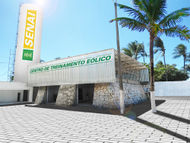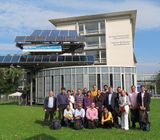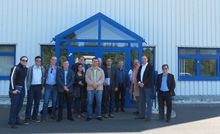Difference between revisions of "Technical Training for Renewable Energies and Energy Efficiency in Brazil"
***** (***** | *****) |
***** (***** | *****) |
||
| Line 1: | Line 1: | ||
| + | |||
= <references /><references />Overview<br/> = | = <references /><references />Overview<br/> = | ||
| Line 5: | Line 6: | ||
<br/> | <br/> | ||
| + | |||
= Introduction = | = Introduction = | ||
Revision as of 21:02, 20 July 2015
Overview
The Brazilian renewable energy market is getting a boost. Skilled personnel along the whole value chain is required to maintain this upswing and to guarantee the quality of photovoltaic, wind power and solar thermal system installations and their maintenance. This article describes the approach of SENAI, the biggest Technical and Vocational Education and Training institution in Latin America - supported by Deutsche Gesellschaft für Internationale Zusammenarbeit (GIZ) GmbH[1] – in establishing standardized further training programs for renewable energy technologies as well as energy efficiency according to industry needs.
Introduction
Brazil is massively investing in renewable energy (RE). It is estimated that the installed capacity of wind energy will quadruple within 8 years from 5.4 GW in 2014 to 21,4 GW by 2022. The photovoltaic sector is less dynamic but gaining momentum as well with a projection of 3GW to be installed by 2022[2].
The Brazilian TVET (Technical and Vocational Education and Training) system does not yet sufficiently provide graduates for the existing and upcoming demand. Renewable energy and energy efficiency are relatively new topics for the majority of training providers and need to be integrated systematically into the TVET system (initial training as well as further training). Curricula need to be developed and standardized, teachers to be trained, new workshops to be build and partnerships with industry established to perform high quality technical training.An important step was taken in this regard by the National Service for Industrial Training (port. Serviço Nacional de Aprendizagem Industrial – SENAI), the biggest TVET institution in Latin America and closely linked to the Brazilian Industry Federation (port. Confederação Nacional da Indústria – CNI).
Training in Wind Power
Two SENAI institutions in the Northeast[3] are preparing to be the first training centers in Brazil to qualify specialized technicians for the wind energy sector. These training programs will focus on
- Operation and maintenance of wind power parks;
- Fabrication and assembly of wind power parks;
- Production and repair of rotor blades.
The cooperation of SENAI with GIZ analyses industry training needs, defines occupational standards and curricula, outlines training center infrastructure and prepares teachers and instructors for the courses that will consist of 20% theory and 80% practical training. The first training programs are supposed to start in 2015.
Implementation Requirements Wind Energy Training Centre - Resumo do Projeto Implementação do Centro de Treinamento Eólico (CTEO) (2013)
Training in Solar Power
In April 2012 the Brazilian Electricity Regulatory Agency, (Agencia Nacional de Energia Elétrica – ANEEL) set the legal framework (ANEEL Resolution N°482[4]) for the use of solar photovoltaic energy systems connected to the electricity grid (→ Net Metering in Brazil). Since then the first bidding process has taken place and the sector is estimated to develop quickly in the next years.
In order to avoid a lack of qualified professionals granting proper and secure installations, TVET institutions need to set up technical training programs for this upcoming sector. SENAI, in cooperation with GIZ, develops occupational standards and prepares the implementation of further training programs with regional training centers.
Tecnical Visit to Germany - Relatório Visita Técnica Energia Solar (2013)
As a first step, SENAI instructors as well as technical staff working closely with industry were sensitized and prepared for their future task during a technical visit to Germany in September 2013. The aim of this visit was to understand how further training programs for the solar sector are organized in Germany and to establish partnerships with German institutions.
The delegation visited the solar school in Freiburg offering specialized courses in photovoltaic and solar cooling / heating, the TÜV Rheinland which operates one of the most advanced laboratories worldwide for testing solar systems as well as the Fraunhofer Institute for Solar Energy Systems ISE, the biggest research institute for solar energy in Europe. Several documents for intended cooperation between SENAI and the visited institutions were signed.
Training in Energy Efficiency
The demand for energy is rapidly increasing in Brazil. The efficient use of energy will play an important role to avoid bottlenecks in the Brazilian energy supply. The national plan for energy efficiency (port. Plano Nacional de Eficiência Energética - PNEf, 2011) defines an energy savings target of 10% by 2030. To meet this target the Brazilian market needs a significant number of qualified professionals able to identify energy saving potentials and subsequently, to plan and implement energy efficiency measures in industry as well as in the building sector. SENAI, with support of GIZ, assesses skills and training needs and defines occupational standards for energy efficiency specialists for these two sectors. Trainers and technical staff are prepared during study visits as well as specialized training courses including practical projects with companies.
Tecnical Visit to Germany - Relatório Visita Técnica Eficiência Energética (2014)
A team of trainers and consultants of the regional SENAI departments was chosen to deepen their knowledge in a technical visit to Germany. The agenda of the study visit, organized by GIZ, included the company Rheinisch-Bergische Druckerei GmbH, which recently implemented an overall energy management concept in compliance with the ISO 50001 specification [5]as well as the energy provider Vattenfall, which operates the biggest urban cooling distribution grid in Germany through energy-efficient use of power-heat cogeneration.
Practical Project on Energy Efficiency in Buildings - Relatório de Análise de Eficiência Energética da Edificação do CNI (2014)
A practical project was conducted to qualify technical staff of regional SENAI training centers as instructors in the area of energy efficiency in buildings. The participants realized an energy audit at the national headquarter of the industrial federation CNI in Brasilia. Saving potentials detected (in total approx. 15% of the overall energy use) ranged from switching to another electricity tariff at the electricity provider to internal and external modifications in the architecture of the building, cooling and illumination systems.
References
- ↑ As a federal enterprise, the Deutsche Gesellschaft für Internationale Zusammenarbeit (GIZ) GmbH supports the federal German government in achieving its international cooperation objectives. Together, Brazil and Germany face global challenges such as preserving biodiversity and fighting climate change. The German Cooperation for Sustainable Development therefore operates primarily in two areas: Protection and sustainable management of Rain Forests as well as Renewable Energies and Energy Efficiency. Within the cooperation with the Brazilian partners GIZ provides advice on strategy development, support for developing management and cooperation structures, as well as technical expertise.
- ↑ MME 2014: Plano Decenal de Expansão de Energia 2023. http://www.epe.gov.br/Estudos/Documents/PDE2023.pdf (Retrieved on 3-12-2015)
- ↑ The Brazilian Centre for Gas and Renewable Energy Technologies (port. Centro de Tecnologias do Gás e Energias Renováveis – CTGAS-ER), operated by SENAI and Petrobras, and the Centre of Wind Power Training (port. Centro de Treinamento Eólico – CTEO) in Fortaleza, operated by the SENAI department of Ceará state
- ↑ ANEEL 2012: Resolução Normativa No. 482. http://www.aneel.gov.br/cedoc/bren2012482.pdf (Retrieved on 3-12-2015)
- ↑ ISO 50001:2011 is an energy management system model created by the International Organization for Standardization (ISO). It provides a framework of requirements for organizations which imply developing policies for energy efficient use and target setting, data collection and measurement, review and improvement. http://www.iso.org/iso/home/standards/management-standards/iso50001.htm (Retrieved on 1-16-2015)






















